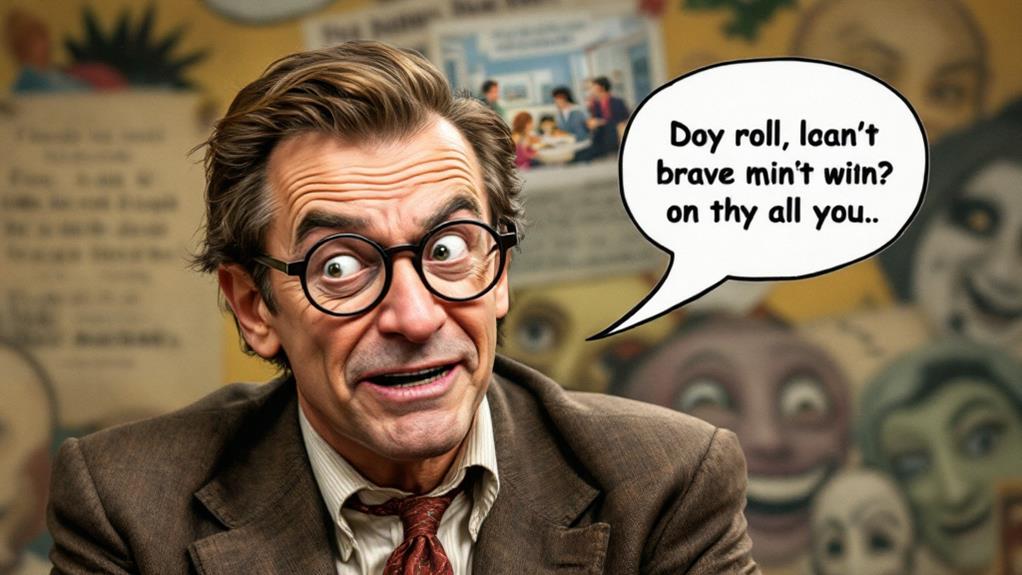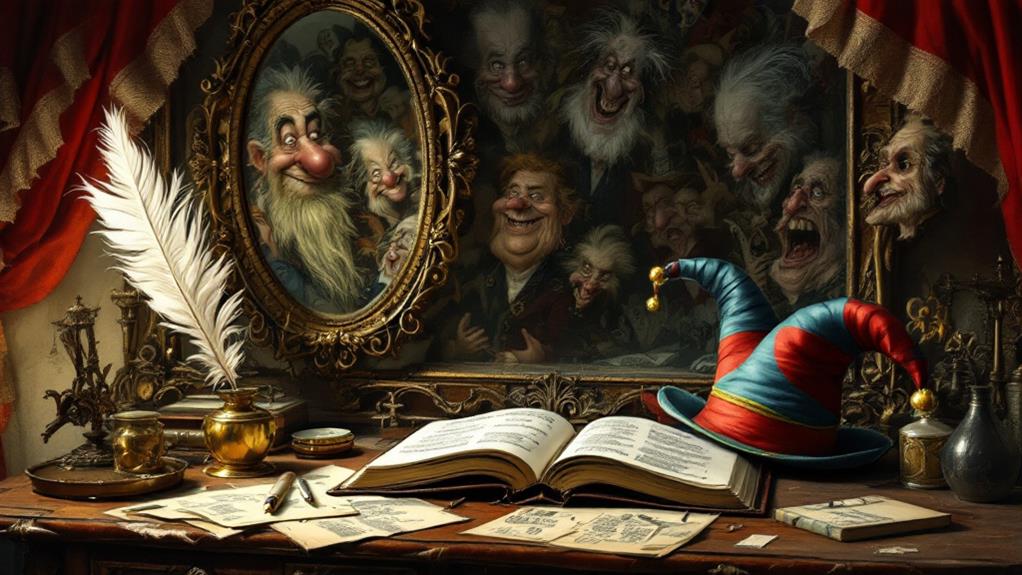What Does It Mean When You Have Wit?

Having wit means you're quick-witted and clever, able to make sharp, often humorous remarks on the fly. You excel at wordplay, puns, and unexpected connections between ideas. Your wit showcases your intelligence, creativity, and social adeptness. It's a precious skill that can help you traverse social situations, diffuse tension, and leave lasting impressions. Witty individuals are often admired for their verbal dexterity and observational skills. While wit is closely related to humor, it's more cerebral and relies on intellect rather than just evoking laughter. There's much more to uncover about the art of wit and its impact on social dynamics.
Defining Wit
When it comes to defining wit, you're dealing with a complex, intricate concept that's often misunderstood. At its core, wit is the ability to perceive and express ideas in a clever, unexpected manner. It's not just about being funny; it's about being quick on your feet mentally and verbally.
Wit involves a sharp intellect and the capacity to make rapid connections between seemingly unrelated concepts. It's the art of delivering quick-witted responses that catch others off guard and leave them impressed or amused. You'll often find that witty people excel at wordplay, puns, and sharp-tongued comebacks.
To be truly witty, you need to possess a profound understanding of language, culture, and human nature. It's about timing, context, and knowing your audience. Wit can be gentle and good-natured or biting and satirical, depending on the situation and the wielder's intent.
In essence, having wit means you can think and respond swiftly, with intelligence and humor. It's an impactful social skill that can enhance your conversations, arguments, and overall communication abilities.
Characteristics of Witty Individuals
Witty individuals often share a set of distinctive traits that set them apart in social situations. You'll notice that they possess an uncanny ability to generate quick-witted responses, often catching others off guard with their clever remarks. This rapid-fire thinking allows them to maneuver conversations with ease, injecting humor and perception at just the right moments.
Another hallmark of witty people is their keen observational skills. You'll find that they're constantly absorbing details about their surroundings, people, and events, which they can later reference in their witty comments. This sharp eye for detail enables them to make unexpected connections and draw parallels that others might miss.
Witty individuals also tend to have a broad knowledge base, allowing them to draw from various topics when crafting their clever remarks. You'll often hear them effortlessly weaving together references from literature, pop culture, and current events. Their ability to think on their feet and adapt to different social situations makes them engaging conversationalists and entertaining companions. Additionally, witty people often possess a playful attitude towards language, delighting in wordplay, puns, and double entendres.
The Psychology Behind Wit

The psychology behind wit reveals fascinating viewpoints into the cognitive processes at work. When you display wit, you're engaging in complex mental acrobatics that blend creativity, intelligence, and social awareness. Your brain rapidly processes information, making unexpected connections and delivering them with flawless timing.
Wit involves several cognitive processes, including:
- Quick information retrieval from your memory
- Rapid analysis of social cues and context
- Creative problem-solving to form novel associations
- Linguistic dexterity to craft clever responses
Your ability to be witty is closely tied to your emotional intelligence and social skills. You're not just showcasing your intellect; you're maneuvering social dynamics with finesse. By using wit, you're often diffusing tension, building rapport, or asserting dominance in subtle ways.
Research suggests that wit is linked to higher overall intelligence and creativity. It's a sign that your brain excels at divergent thinking, allowing you to see multiple perspectives and draw unconventional connections. Your witty remarks aren't just entertaining; they're a window into your cognitive flexibility and social adaptability.
Wit vs. Humor
Despite their frequent association, wit and humor have distinct characteristics that set them apart. While both aim to entertain, wit relies on intellect and cleverness, often manifesting as quick-witted responses or subtle word play. Humor, on the other hand, is broader and can include physical comedy, slapstick, or situational jokes.
You'll notice that wit often requires a sharp mind and the ability to think on your feet. It's characterized by brevity and precision, providing a punch in just a few words. Humor, however, can be more drawn out and doesn't always demand the same level of mental agility.
Wit tends to be more cerebral, appealing to the intellect of the audience. It's often used in satire, irony, and clever observations about life and society. Humor, while it can be intelligent, doesn't necessarily need to be. It's primary goal is to evoke laughter, while wit aims to impress with its cleverness.
You might find that witty people are admired for their quick thinking and verbal dexterity, while funny people are appreciated for their ability to make others laugh.
Developing Your Wit

Developing wit isn't an overnight process, but with practice and dedication, you can sharpen your mental acuity and verbal skills. Start by expanding your knowledge base through reading, watching diverse content, and engaging in stimulating conversations. This will provide you with a rich pool of information to draw from when crafting witty responses.
Employ brainstorming techniques to generate clever word associations and puns. Keep a journal of witty observations and practice refining them. Engage in word games and puzzles to enhance your linguistic agility. Additionally, focus on practicing verbal dexterity by participating in improvisational exercises or joining a debate club.
To create vivid mental imagery and improve your wit, try these exercises:
- Describe everyday objects using unexpected comparisons
- Rewrite movie plots with absurd twists
- Invent nonsensical explanations for common phenomena
- Create outlandish backstories for strangers you observe
Historical Figures Known for Wit
Throughout history, numerous individuals have left their mark not just through their accomplishments, but also through their razor-sharp wit. You'll find that many influential political figures and renowned literary figures are celebrated for their quick thinking and clever remarks.
In the domain of politics, Winston Churchill stands out for his biting comebacks and humorous quips. His wit often disarmed opponents and lightened tense situations. Similarly, Abraham Lincoln's self-deprecating humor and folksy wisdom endeared him to many.
Among literary figures, Oscar Wilde's epigrams and witty observations continue to be quoted today. His clever wordplay and social commentary made him a beloved and controversial figure. Mark Twain, known for his satirical humor, used wit to critique society and human nature.
You'll also find Dorothy Parker's acerbic wit in her poetry and criticism, while George Bernard Shaw's plays sparkled with intellectual humor. These historical figures demonstrate how wit can be a powerful tool for communication, persuasion, and social commentary. Their legacies remind you that a well-timed quip or clever observation can leave a lasting impact on society and culture.
Wit in Literature and Media

Wit's sharp edge has carved a prominent place in literature and media throughout the ages. You'll find it manifested in clever dialogue, satirical commentary, and biting observations that challenge societal norms. From Shakespeare's plays to modern sitcoms, wit serves as a powerful tool for engaging audiences and conveying poignant messages.
In literature, you'll encounter wit in various forms:
- Jane Austen's sardonic observations on social classes
- Oscar Wilde's epigrammatic quips in "The Importance of Being Earnest"
- Mark Twain's satirical critiques of American society
- Dorothy Parker's acerbic poetry and short stories
Media has adopted wit as a cornerstone of entertainment. You'll find it in the rapid-fire banter of Aaron Sorkin's screenplays, the deadpan delivery in British comedy shows, and the cultural satire of "The Simpsons." Wit in these contexts often serves as a vehicle for social commentary, allowing creators to address serious issues through humor.
As you consume literature and media, you'll notice that wit isn't just about being funny; it's about being insightful, provocative, and thought-provoking. It challenges you to think critically and see the world from new perspectives.
Cultural Perceptions of Wit
Cultural perceptions of wit vary widely across societies and time periods. In Western cultures, you'll often find wit highly valued as a sign of intelligence and social adeptness. However, societal expectations of wit can differ considerably in other parts of the world. For instance, in some Asian cultures, direct wit might be seen as disrespectful or confrontational, especially when directed at authority figures.
Cultural biases towards wit also play a role in how it's perceived. In some societies, quick-witted responses are celebrated, while in others, thoughtful, measured replies are more appreciated. You might notice that in certain professional settings, wit is encouraged as a way to build rapport, while in others, it's seen as inappropriate or unprofessional.
The historical background of a culture can shape its view of wit as well. Societies that have experienced oppression might value subversive wit as a form of resistance, while those with a strong tradition of respect for hierarchy might view it more cautiously. Your understanding of these cultural intricacies can help you manage social situations more effectively when interacting across different cultural environments.
The Social Benefits of Wit

A sharp wit can be your ticket to social success. When you're quick with clever remarks and humorous observations, you'll find yourself at the center of attention in social gatherings. Your wit can help you in cultivating meaningful connections, as people are naturally drawn to those who can make them laugh and think simultaneously.
By wielding your wit effectively, you're maximizing social influence in various settings. Whether it's a business meeting or a casual get-together, your ability to inject humor and intelligence into conversations can:
- Break the ice in tense situations
- Diffuse conflicts with well-timed quips
- Enhance mundane topics into engaging discussions
- Create memorable moments that strengthen relationships
Your wit can also serve as a powerful tool for networking and career advancement. People remember those who can entertain and inform simultaneously, making you more likely to be recommended for opportunities or included in important social circles. However, it's crucial to use your wit judiciously, ensuring you're not crossing boundaries or offending others. When applied thoughtfully, your wit can be a valuable asset in navigating social realms and building lasting connections.
Potential Drawbacks of Wit
While wit can be a powerful social tool, it's not without its pitfalls. You might find yourself falling into the trap of overconfidence, assuming your clever remarks will always land well. This can lead to misreading social cues and potentially offending others unintentionally. Your quick tongue might also tempt you to make cutting remarks or sarcastic comments that hurt feelings, even if that wasn't your intention.
Another drawback is the risk of social exclusion. If you're constantly cracking jokes or making witty observations, some people might find it difficult to connect with you on a deeper level. They may perceive you as always being "on" or unable to engage in serious conversations. Additionally, your wit might intimidate others who feel they can't keep up, leading them to avoid interactions with you.
You'll need to be mindful of when and how you use your wit. Balance is key. Learn to read the room and recognize when humor is appropriate and when it's better to be straightforward. Developing emotional intelligence alongside your wit will help you maneuver social situations more effectively.




